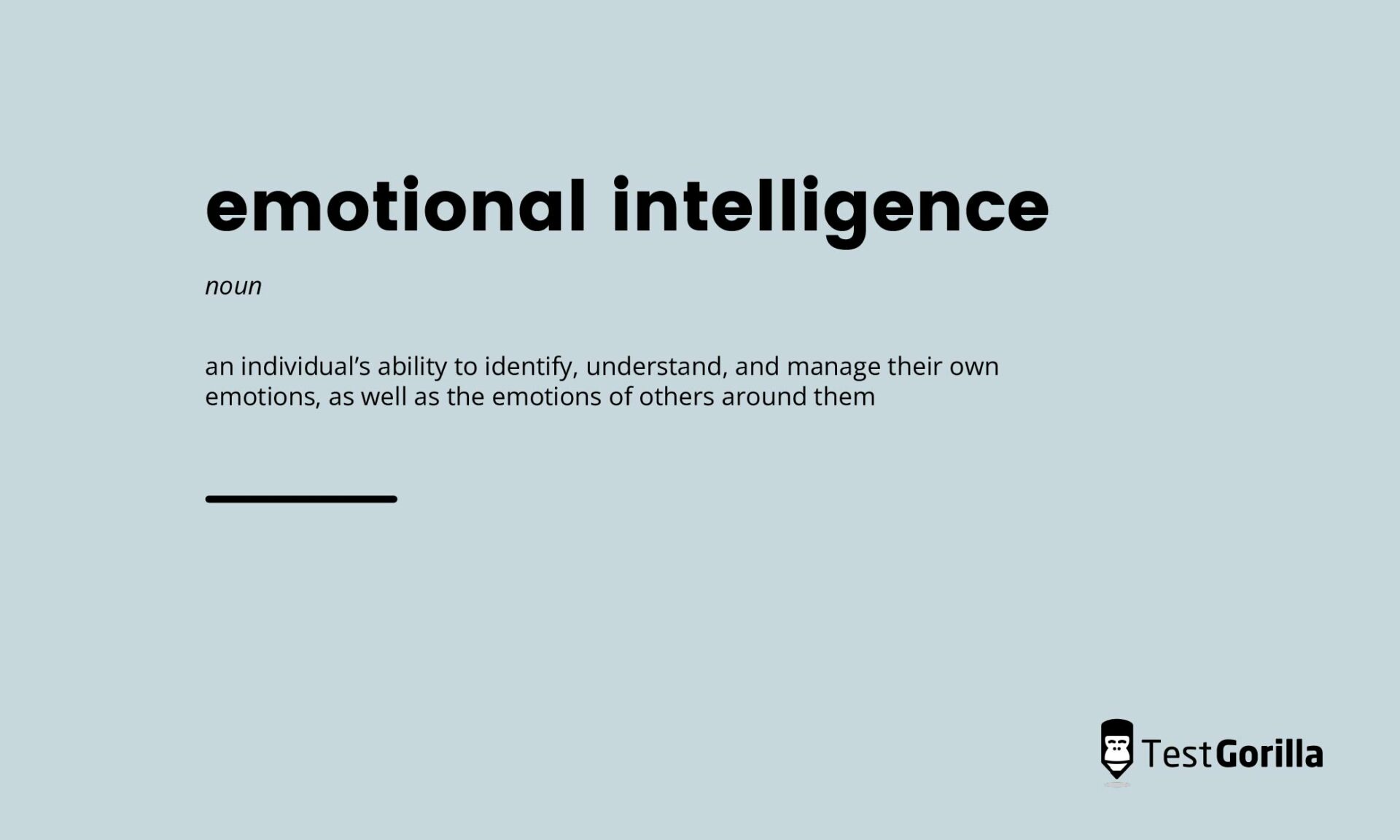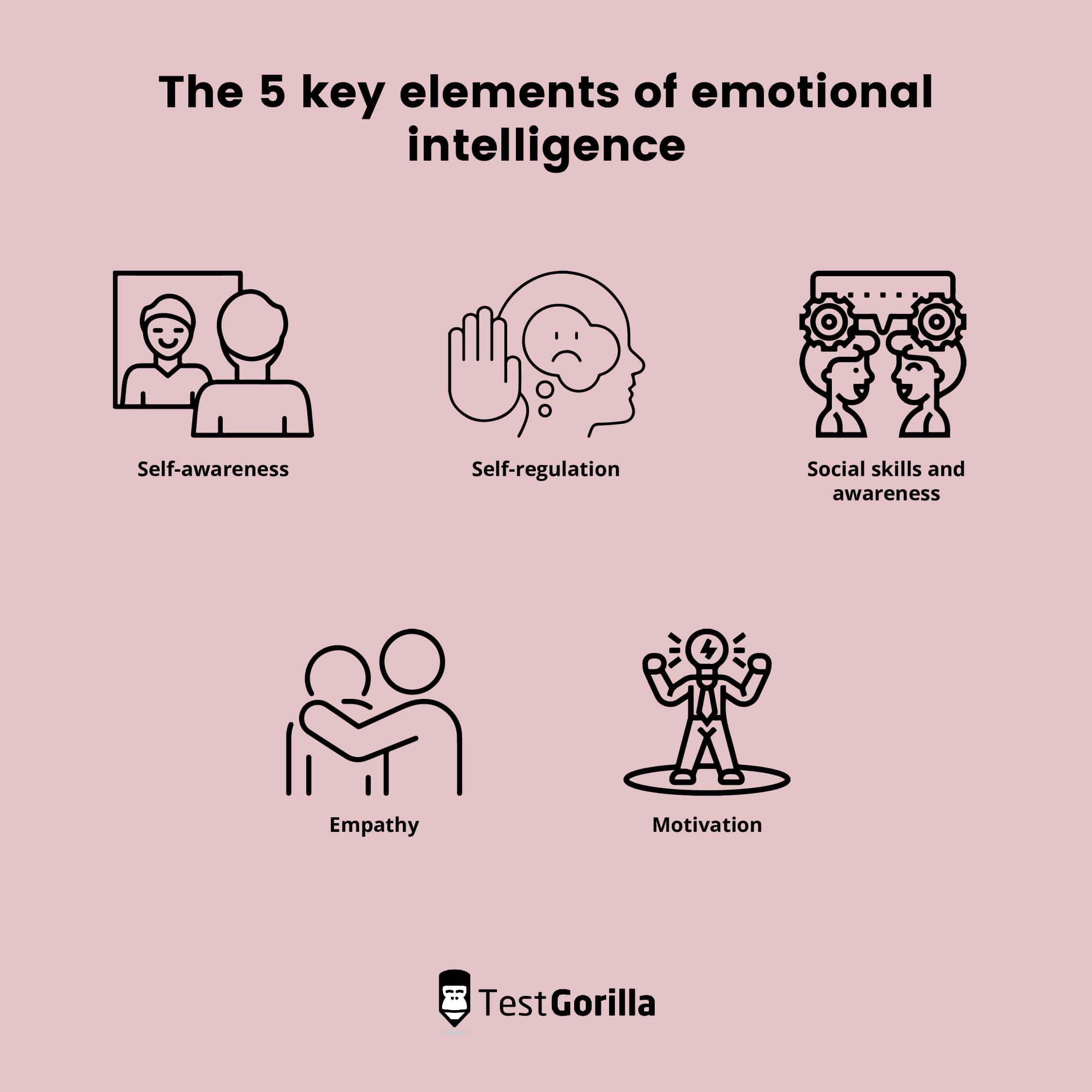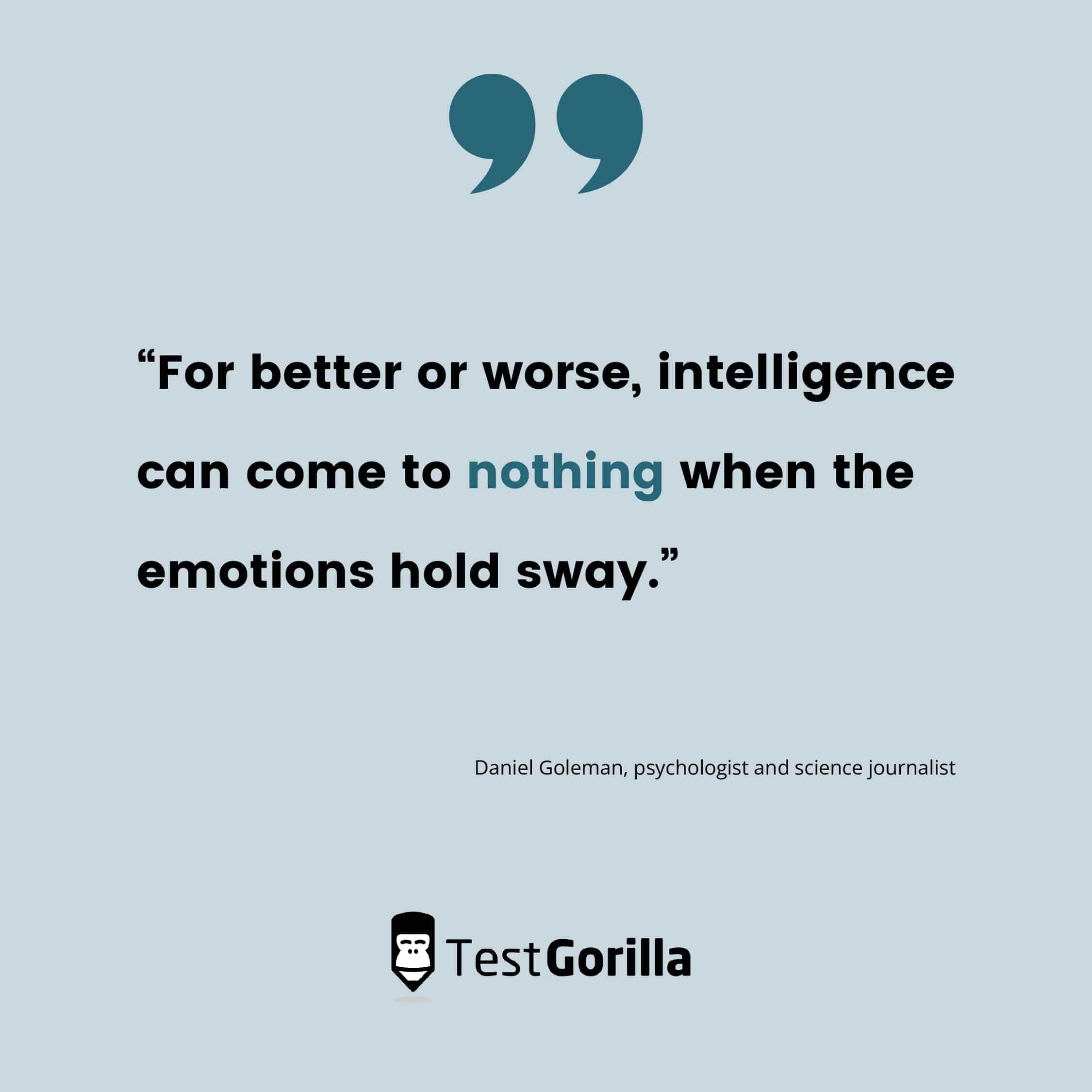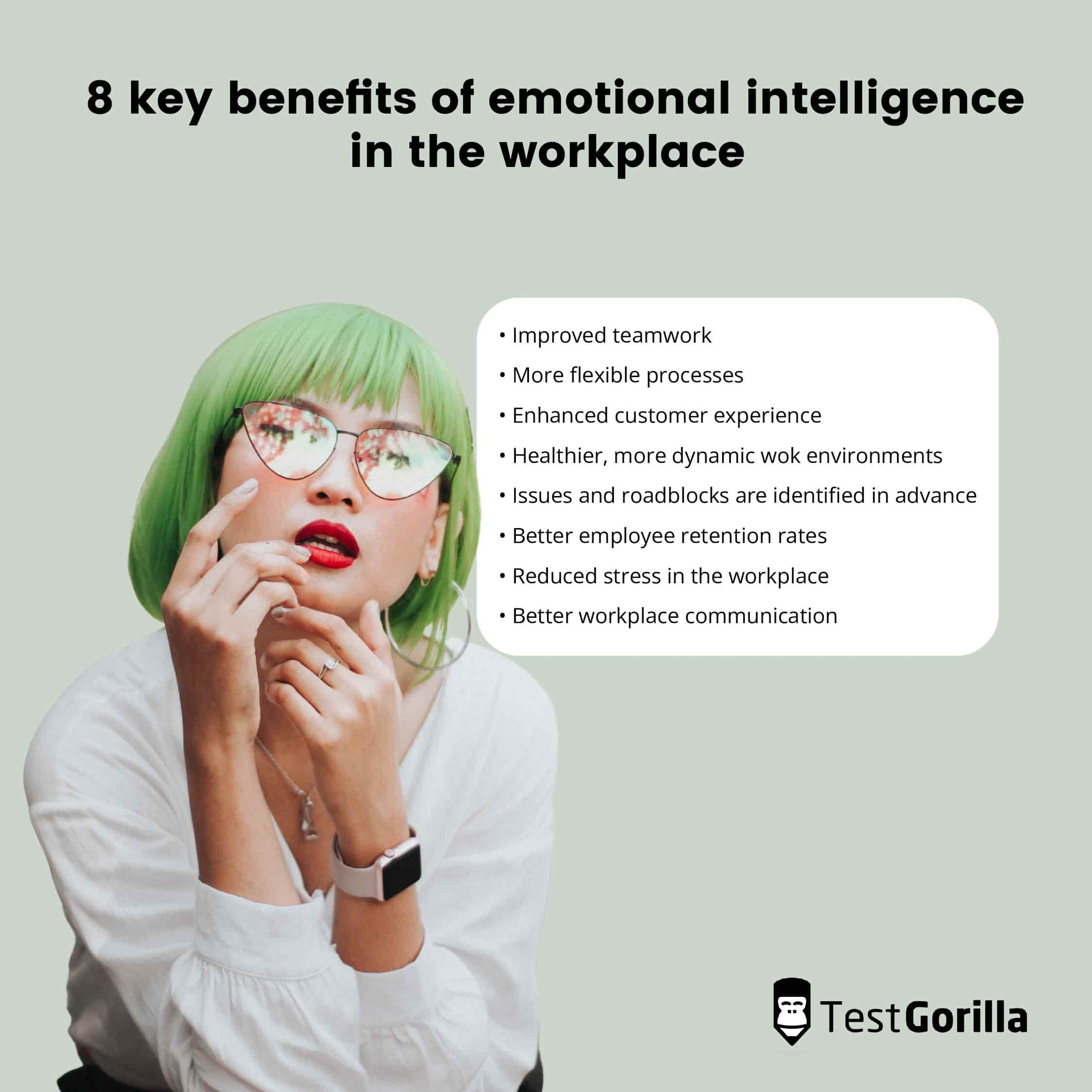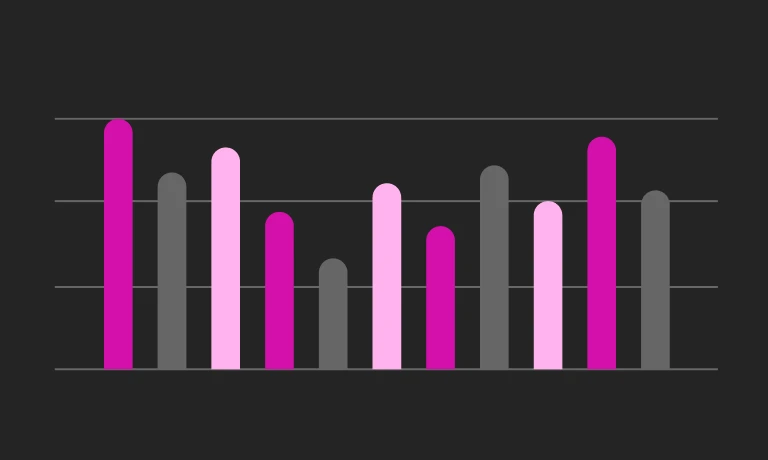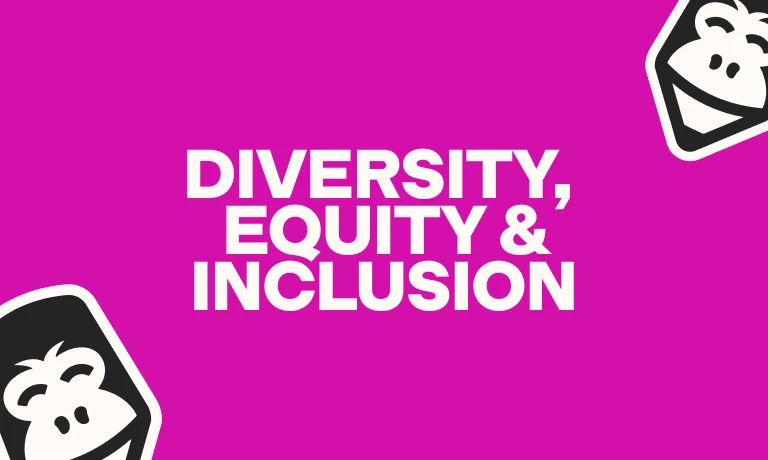The importance of emotional intelligence in the workplace
Many businesses create job descriptions that list great communication, problem-solving, and leadership skills as key attributes for the open role. However, these three skills are all rooted in one fundamental trait: emotional intelligence.
In this guide, we’ll fill you in on everything you need to know about the effects of emotional intelligence in the workplace, what emotional intelligence looks like, and, most importantly, how to test applicants for this essential attribute.
Table of contents
- What is emotional intelligence?
- The 5 key elements of emotional intelligence
- EQ vs. IQ: What’s the difference?
- Why is emotional intelligence in the workplace so important to your business?
- 8 key benefits of emotional intelligence in the workplace
- How do you measure or test emotional intelligence?
- How to hire for emotional intelligence
- Employees with high emotional intelligence are an asset to your organization
What is emotional intelligence?
Emotional intelligence refers to an individual’s ability to identify, understand, and manage their own emotions, as well as the emotions of others around them.
Those with high emotional intelligence also understand how their emotions can affect others and are able to harness and regulate them to ensure that they don’t negatively affect their colleagues’ ability to interact with one another or carry out their responsibilities.
They can use this ability in the workplace to manage conflict, communicate effectively, and empathize with colleagues to improve business performance.
The term “emotional intelligence” was first coined by psychologists Peter Salovey and John D. Mayer in 1990.
A few years later, psychologist and science journalist Daniel Goleman wrote the book “Emotional Intelligence,” in which he penned the following phrase: “For better or worse, intelligence can come to nothing when the emotions hold sway.”
With this phrase, Goleman claimed that no matter a person’s level of cognitive intelligence, it can be “overridden” when emotions get the better of them.
Emotional intelligence in the workplace is often cited as a key factor of success – in fact, a well-known study showed that 90% of top performers have above-average emotional intelligence. Yet, many organizations still don’t prioritize searching for candidates with high levels of emotional intelligence during the hiring process.
The 5 key elements of emotional intelligence
According to Goleman, emotional intelligence does not refer to just one thing. In fact, he broke down the broader concept of emotional intelligence into five key pillars.
Let’s take a look at each element of emotional intelligence in a little more detail.
1. Self-awareness
Self-aware people can easily recognize their own feelings, strengths, and weaknesses, as well as those of others. They also understand how their feelings can impact certain situations and have a solid grasp of who they are as people and how they relate to others.
2. Self-regulation
Being self-aware is great, but those with a high level of emotional intelligence are also able to regulate their feelings and emotions and adapt well to unfamiliar situations.
Self-regulation also encompasses the ability to control one’s feelings rather than letting emotions take over, no matter how stressful or frustrating the situation is.
3. Social skills and awareness
Those who are emotionally intelligent also tend to have strong social skills. This means that they’re able to react appropriately and with candor regardless of the situation or the people they need to communicate with – they can handle the good, the bad, and the ugly.
They also tend to have great listening skills, can easily build rapport, and understand people’s body language and social cues.
4. Empathy
The ability to empathize with others is a key facet of emotional intelligence since it enables a person to evaluate different perspectives respectfully and constructively.
Whether they’re involved in someone’s personal issues or a business decision, those with empathy can extend compassion and understanding to others without judgment.
5. Motivation
Motivation drives a person to do what they do every day, and those who are self-motivated often have high emotional intelligence.
They’re also able to pinpoint the intrinsic reasons behind the actions that they take, are eager to improve and achieve, and have a solid commitment to their goals.
The best insights on HR and recruitment, delivered to your inbox.
Biweekly updates. No spam. Unsubscribe any time.
EQ vs. IQ: What’s the difference?
You’ve almost certainly heard of the intelligence quotient (IQ), but what does emotional quotient (EQ) mean? EQ is essentially synonymous with emotional intelligence. It is often used to measure a person’s level of emotional intelligence based on their responses to a test or quiz.
IQ is a number derived from an intelligence test that evaluates a person’s cognitive abilities, problem-solving skills, and reasoning skills.
On the other hand, EQ is a number derived from a test that measures one’s level of emotional awareness, including their social and emotional competencies.
Behavioral research has long shown that an individual’s success at work depends only 20% on their intellect and 80% on their level of emotional intelligence.
Why is emotional intelligence in the workplace so important to your business?
Not only do emotionally intelligent people make independent, confident, and successful employees, but they’re also vital to building teams that excel and maintaining a cohesive and high-performing environment.
Here are just a few reasons your company needs to prioritize building teams consisting of employees with high levels of emotional intelligence.
1. Emotionally intelligent employees have a huge impact in the workplace
Well-known research by the American Journal of Pharmaceutical Education found that highly emotionally intelligent people are better equipped to make sound decisions, create sustainable relationships, and handle continuous change.
Naturally, these are traits of great leaders. Other research has shown that emotional intelligence is also a strong predictor of job satisfaction and career success and that emotionally intelligent individuals receive greater merit increases compared with those with lower levels of emotional intelligence.
2. The job market is evolving
As the modern workplace becomes more dependent on technology, machine learning, and artificial intelligence, emotional intelligence will be critical to organizations’ success.
With the rise of the high-tech workplace, organizations across all industries will soon come to recognize the importance of high touch and the need to balance digital transformation with human strengths, such as empathy and self-awareness.
Emotionally intelligent leaders will be in high demand to help guide the future workplace, motivate a new generation of employees, and navigate the merge between technology and people.
3. Emotional intelligence is already a “must-have” skill
Businesses are turning away from “perfect” candidates who look good on paper to applicants they can trust to be reliable, empathetic change agents.
Research reveals that 74% of executives believe that emotional intelligence is becoming a “must-have” skill.
The same study shows that, in general, companies are actively trying to develop more emotionally intelligent workplaces by adjusting recruitment processes to evaluate candidates’ emotional intelligence and using technology to help create emotionally intelligent workplace cultures.
8 key benefits of emotional intelligence in the workplace
Building emotionally intelligent teams can foster positive outcomes for businesses and employees alike. Here are eight key benefits of emotional intelligence in the workplace.
1. Improved teamwork
Thanks to their strong sense of self-awareness, self-regulation, and great social skills, emotionally intelligent employees are adept at working in teams and are great team players. They work with the best outcomes in mind, are open to new ways of solving problems, and are comfortable sharing in others’ successes.
2. More flexible processes
Emotionally intelligent employees are highly flexible and adaptable in dynamic workplaces. They recognize when established processes aren’t producing the desired outcomes and are skilled at suggesting and developing new ways of doing things to get the best results.
In general, those with high levels of emotional intelligence can navigate all aspects of their work life effectively and with ease.
3. Enhanced customer experience
Excellent social skills and empathy are a winning combination when it comes to providing a great customer experience. Emotional intelligence is a great attribute for building relationships and keeping the customer’s best interests in mind.
Since they’re able to easily put themselves in another’s shoes, emotionally intelligent people can also identify ways to improve the customer experience.
4. Healthier, more dynamic work environments
Emotionally intelligent people can communicate with others in a healthy, constructive way, which helps increase workplace productivity. They’re also able to boost morale when needed since they can read others’ emotions easily.
Because they’re able to self-regulate their own feelings, they’re more open to experimentation and learning, too.
5. Issues and roadblocks are identified in advance
Those with a high degree of emotional intelligence are aware of what’s going on around them and can spot issues before they become a problem. For example, they can notice subtle signs that a colleague is struggling or disengaged and can help them to air any complaints or issues they’re having.
They’re also confident enough to raise issues directly with others without fear of criticism or pushback to prevent small issues from becoming damaging later down the line.
6. Better employee retention rates
As the saying goes, people don’t work for companies – they work for people. Those who work in an environment with emotionally intelligent leaders and colleagues are more likely to stay at those organizations since they can avoid interpersonal conflicts, enjoy a healthy work-life balance, and thrive in their careers.
7. Reduced stress in the workplace
Since emotionally intelligent people can effectively regulate their feelings and emotions, they’re less prone to feeling stressed in the workplace. They don’t let pressure build up and can communicate with the relevant people about their workloads or any other job-related issues.
Their resilient nature also enables them to tolerate stress better, which gives them more space to carry out their responsibilities without hindrance.
8. Better workplace communication
In emotionally intelligent workplaces, there’s no room for snarky emails or snide comments. Emotionally intelligent employees can see miscommunications for what they are and view things from other perspectives.
When issues arise, they’re able to craft healthy and productive responses rather than vent their frustrations in an uncontrolled way.
How do you measure or test emotional intelligence?
An IQ test can assess an applicant’s cognitive abilities and provides you with a score that indicates their intellectual potential. But can you really measure a candidate’s emotional intelligence?
Although EQ tests do exist, many people claim that emotional intelligence cannot be tested or measured due to a lack of global standardization.
Plus, just as applicants can lie on their resumes, they can also “fake” EQ self-assessments by providing responses they think employers will favor rather than answers that reflect their real emotional intelligence.
Finally, it’s often difficult for hiring teams without experience in evaluating candidates’ emotional intelligence to know how to interpret the results of EQ tests.
How to hire for emotional intelligence
Since EQ tests are not a highly reliable or accurate method of evaluating emotional intelligence, how do you hire for emotional intelligence?
Building an emotionally intelligent workplace begins with baking the commitment to hiring emotionally intelligent people into your hiring process.
Below, we go through the steps you should take to make emotional intelligence at work a reality.
1. Commit to hiring for emotional intelligence
First things first: If you want to build an emotionally intelligent workplace, you need to commit to knowing how to hire candidates with high levels of emotional intelligence.
Traditional hiring processes rely heavily on resume screening and evaluating applicants’ education and work experience. However, it’s impossible to judge someone’s emotional intelligence by scanning a one- or two-page document.
When you’re defining your candidate personas, make sure that emotional intelligence is a priority criterion before you start taking applications from candidates.
2. Learn to evaluate emotional intelligence indicators during the interview process
Asking questions that help you assess a candidate’s emotional intelligence in the interview process is crucial.
Traditional interview processes make it difficult to gauge applicants’ soft skills, so make sure to create standardized interview questions that can help you evaluate how emotionally intelligent candidates are.
Skip questions that ask applicants to list their strengths and weaknesses. Instead, ask questions that prompt candidates to tell a story that shows their level of emotional intelligence. Better still, include some of the following questions in your interviews:
Can you tell me about your toughest day at work, what went wrong, and how you handled it?
Can you describe a time when you were given critical feedback?
Can you tell me about a time when you clashed with a colleague? What was the outcome?
What makes you happy at work?
How do you deal with changes at work that you don’t agree with?
How do you build relationships with colleagues?
What’s your greatest motivation at work?
When you encounter colleagues who are difficult to communicate with, how do you handle the situation?
How do you handle stressful situations in the workplace? Can you give me an example?
What’s the biggest mistake you’ve made at work? What happened, and what was the outcome?
3. Look out for candidates who ask great questions
Once you’ve asked applicants some of these questions, make a note of those who are eager to ask thoughtful questions.
Candidates who ask good questions about your company’s values, culture, and working methods likely have great critical-thinking skills, which are key to emotional intelligence.
Employees with high emotional intelligence are an asset to your organization
As more organizations begin to understand the importance of emotional intelligence in helping them thrive, they’re becoming increasingly interested in hiring people with high levels of emotional intelligence.
But as we’ve explored, emotional intelligence is not just one characteristic or trait. And although there are many EQ tests available, the results aren’t sufficiently reliable since they usually require candidates to self-report.
TestGorilla, on the other hand, provides you with objective, scientifically validated tests that can accurately evaluate applicants using data.
Since emotional intelligence encompasses a range of skills and attributes, you should create skills assessments that evaluate candidates in several key areas:
Communication skills
Situational judgment skills
Personality and culture add
If you’re ready to evaluate applicants holistically, try TestGorilla for free and start building an emotionally intelligent workforce today.
You've scrolled this far
Why not try TestGorilla for free, and see what happens when you put skills first.


